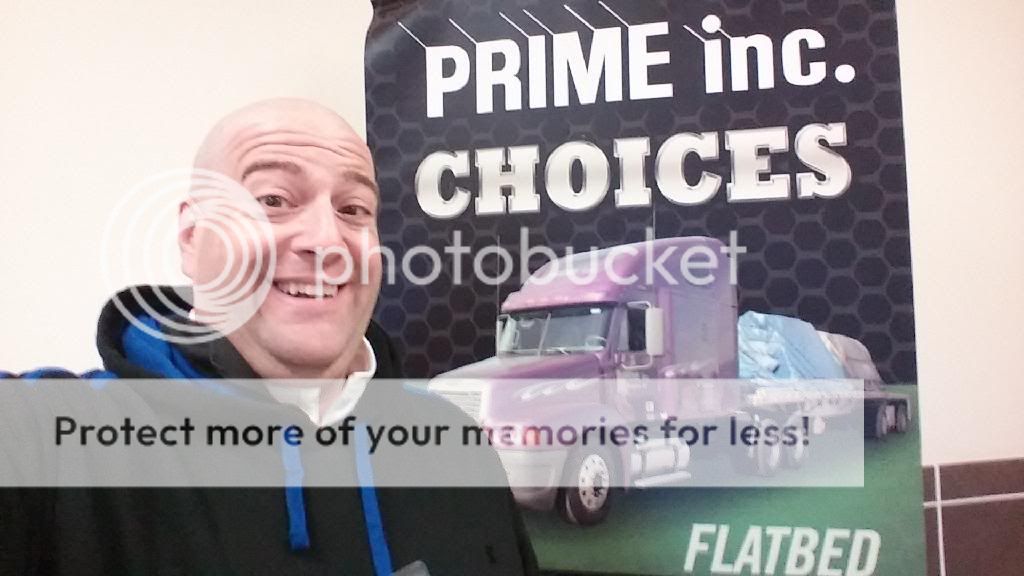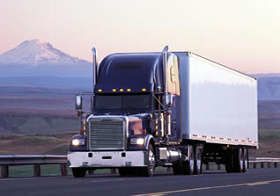Schneider Bulk New Hire Experience
Topic 998 | Page 2
I think you are right with the plausible deniablity thing. I understand pay rates change in trucking very often. But any prospective hire would understand that. If recruiter do not want to give something in writing, that to me means they have something to hide.
And I am sure I intimidated a lot of recruiters with my huge list. But honestly... we are making a career decision, and a LIFESTYLE decision, these questions need to be answered. If the recruiter does not want to help me choose the right company... then again that is NOT a company I want to work with.
Just remember, don't be inconsiderate or anything when asking questions. Be professional and courteous and tell the recruiter that you want to make an INFORMED decision, that you want to find a good match for yourself and for the company.
thats very correct. Some people make enormous sacrifices to start out like quitting a job, putting stuff into storage, selling their car etc......
then if somebody goes through all that to go out to Springfield MO or Iowa from NY and they find out the pay isnt what is promised or they require you to drive in teams- its going to be a huge disappointment. Then your stuck out there and if you leave on your own you have no return ticket.....not exactly a good situation.
In my opinion the more questions asked the better and also, recruiters to a certain extent should not be made to feel they can push new recruits around by telling lies, misleading or deceiving.
SAP:
Substance Abuse Professional
The Substance Abuse Professional (SAP) is a person who evaluates employees who have violated a DOT drug and alcohol program regulation and makes recommendations concerning education, treatment, follow-up testing, and aftercare.
OOS:
When a violation by either a driver or company is confirmed, an out-of-service order removes either the driver or the vehicle from the roadway until the violation is corrected.
Just so everyone knows - the information and reviews of company-sponsored training programs we have is very, very extensive. We called the companies ourselves with a monstrous list of questions - everything we could think of. In fact, we have far more information on our website about these programs than the companies do on their own websites. So it's really not necessary to start from scratch with your own list of questions. Work your way through our information and if there are any questions you still have, then ask the recruiters.
But we have between 5 and 7 long pages of information on every company. There's a mountain of it.
We also have the same type of information on some of the trucking companies that hire inexperienced drivers for anyone going through a private truck driving school.
CDL:
Commercial Driver's License (CDL)
A CDL is required to drive any of the following vehicles:
- Any combination of vehicles with a gross combined weight rating (GCWR) of 26,001 or more pounds, providing the gross vehicle weight rating (GVWR) of the vehicle being towed is in excess of 10,000 pounds.
- Any single vehicle with a GVWR of 26,001 or more pounds, or any such vehicle towing another not in excess of 10,000 pounds.
- Any vehicle, regardless of size, designed to transport 16 or more persons, including the driver.
- Any vehicle required by federal regulations to be placarded while transporting hazardous materials.
Company-sponsored Training:
A Company-Sponsored Training Program is a school that is owned and operated by a trucking company.
The schooling often requires little or no money up front. Instead of paying up-front tuition you will sign an agreement to work for the company for a specified amount of time after graduation, usually around a year, at a slightly lower rate of pay in order to pay for the training.
If you choose to quit working for the company before your year is up, they will normally require you to pay back a prorated amount of money for the schooling. The amount you pay back will be comparable to what you would have paid if you went to an independently owned school.
Company-sponsored training can be an excellent way to get your career underway if you can't afford the tuition up front for private schooling.

Thanks for the post. I am currently enrolled in a Truck Driving school in Minnesota and we get recruiters in here every week. I have been in contact with Schneider and one other Company in regards to working for them after completion of school. The other company sent out a detailed list of most of the things you had mentioned in your question list. I am really looking forward to my time out on the road once I finish this school and the training by what ever company I do decide to go with.
Daryl W. aka Bubba D

· Over the road instruction with a Prime Instructor
· Over the road training with a Prime Trainer
What is the difference between an Instructor and a trainer?
Over The Road:
Over The Road
OTR driving normally means you'll be hauling freight to various customers throughout your company's hauling region. It often entails being gone from home for two to three weeks at a time.

· Over the road instruction with a Prime Instructor
· Over the road training with a Prime Trainer
What is the difference between an Instructor and a trainer?
Well, an instructor, instructs...and a trainer trains...
but seriously, your "instructor" is who will be teaching you to drive, back, park, inspect and get to know the truck and help you get your CDL..your "trainer" is who you will go OTR with for actual training in how to be a truck driver..but it is by NO MEANS comprehensive..you will only learn probably 1/10th of what you will need to know...that other 9/10th's come from experience...that's why those in the know, tell you..your first year is the hardest..it's a steep learning curve..and you will get inundated with more information than you will probably be able to process for quite a while...hope this helps..
CDL:
Commercial Driver's License (CDL)
A CDL is required to drive any of the following vehicles:
- Any combination of vehicles with a gross combined weight rating (GCWR) of 26,001 or more pounds, providing the gross vehicle weight rating (GVWR) of the vehicle being towed is in excess of 10,000 pounds.
- Any single vehicle with a GVWR of 26,001 or more pounds, or any such vehicle towing another not in excess of 10,000 pounds.
- Any vehicle, regardless of size, designed to transport 16 or more persons, including the driver.
- Any vehicle required by federal regulations to be placarded while transporting hazardous materials.
OTR:
Over The Road
OTR driving normally means you'll be hauling freight to various customers throughout your company's hauling region. It often entails being gone from home for two to three weeks at a time.
Over The Road:
Over The Road
OTR driving normally means you'll be hauling freight to various customers throughout your company's hauling region. It often entails being gone from home for two to three weeks at a time.
HOS:
Hours Of Service
HOS refers to the logbook hours of service regulations.
Been with Schneider Bulk for a week on my own now. I love it so far. Training was very good, they taught us everything we need. Now I am just fine tuning things and getting more comfortable with the truck and the road.
Like Brett says... Make sure you understand HOURS OF SERVICE. Very important when you are out here. Also trip planning super important (you will learn that in school or company training).
My experience with Schneider has been good. I asked all the recruiters I contacted while in CDL school to answer, by email (that way I have it in writing), a long list of questions. Some recruiters told me they cannot communicate by email, so I told them if they cannot write things down for me or take the time to, then I am not interested in their company. But most did comply. The answers to those questions helped me fine tune my decision.
So far Schneider has made good on everything my recruiter told me. I was told I would receive a sign-on bonus in installments on X, Y, Z dates... today I received my first one just as promised. Recruiter told me 2000-2500 miles per week for newbies is what I should expect... My first week I got 2600 miles.
Also to ALL of you. DO NOT be scared of Tankers. Seriously the surge is not that bad once you learn to manage it. Just like shifting is hard at first, and the pre-trip, and everything else. The surge just makes you a better driver (sorry Van/Reefer/Flatbed people lol) because you are constantly thinking about it.
Here is my list. Hope it helps some of you.
Questions for Trucking Company Recruiters
Company Name:
Recruiter Name:
Phone Number:
Email:
1. Where is your orientation?
2. Is the orientation a controlled curriculum for subject matter and teaching points? Mileage? Time?
3. Do the trainers get graded by the students after completion or is there a feedback loop to make the training better? Team driving during training?
4. What is the pay during orientation and training?
5. What is the pay after training completion? List for each division please: tanker, dry van , reefer , etc. Please list if it is for ALL miles, or is a progressive (“tiered”) pay scale.
6. Any bonuses post completion? 6 months? 1 year?
7. Is there a 401k and how is it structured? Cap limits? How much does the company match?
8. During orientation are lodging and meals paid for by the company?
9. If the trainer takes home time does the newbie keep driving?
10. What electronics does your company furnish to make a more safe and efficient driver?
11. Where are the main hubs?
12. Does the company have any dedicated contracts? Divisions? Is the newbie eligible for them?
13. What medical and dental plans are offered? Details and pricing of each plan to include time with company?
14. Can you switch trainers if it doesn't work between the two of you for whatever reason?
15. Idling policy?
16. Inverter installation policy? APU in trucks?
17. Is per diem built into the pay?
18. Breakdown and layover pay? Detention pay?
19. Are they no touch or is unloading involved? Pay for unloading?
20. How many miles do they usually put on a truck before they pull it from the fleet?
21. How does the pay period work? Do they use TRANSFLO and does it cost you? Do bills have to be sent in by a certain day to get paid during a week?
22. General home-time policy and where they want the truck when you go home?
23. Slip seating or assigned trucks?
24. What speed are trucks governed at?
25. Vacation policy?
26. What miles are paid miles and what miles are not?
27. When am I working and not getting paid?
28. If weather, driver (sick) or road conditions are such that I feel it is unsafe to continue driving, will I be penalized for parking until it is safe?
29. What are the reasons I could be disciplined and or fired for?
30. What can I expect my first year earnings to be? 2nd year?
31. How many miles per week does a newbie average?
32. Is there a tuition reimbursement program? Explain how it works please.
33. How many of their recruits as a percentage remain past 90 days?
34. What is the number 1 reason new recruits quit or their biggest complaint when they're terminated?
Wow! I thought I was bad. LOL have you ever gotten a recruiter to answer all those questions?
CDL:
Commercial Driver's License (CDL)
A CDL is required to drive any of the following vehicles:
- Any combination of vehicles with a gross combined weight rating (GCWR) of 26,001 or more pounds, providing the gross vehicle weight rating (GVWR) of the vehicle being towed is in excess of 10,000 pounds.
- Any single vehicle with a GVWR of 26,001 or more pounds, or any such vehicle towing another not in excess of 10,000 pounds.
- Any vehicle, regardless of size, designed to transport 16 or more persons, including the driver.
- Any vehicle required by federal regulations to be placarded while transporting hazardous materials.
Dry Van:
A trailer or truck that that requires no special attention, such as refrigeration, that hauls regular palletted, boxed, or floor-loaded freight. The most common type of trailer in trucking.Per Diem:
Getting paid per diem means getting a portion of your salary paid to you without taxes taken out. It's technically classified as a meal and expense reimbursement.
Truck drivers and others who travel for a living get large tax deductions for meal expenses. The Government set up per diem pay as a way to reimburse some of the taxes you pay with each paycheck instead of making you wait until tax filing season.
Getting per diem pay means a driver will get a larger paycheck each week but a smaller tax return at tax time.
We have a ton of information on our wiki page on per diem pay
Reefer:
A refrigerated trailer.
HOS:
Hours Of Service
HOS refers to the logbook hours of service regulations.APU:
Auxiliary Power Unit
On tractor trailers, and APU is a small diesel engine that powers a heat and air conditioning unit while charging the truck's main batteries at the same time. This allows the driver to remain comfortable in the cab and have access to electric power without running the main truck engine.
Having an APU helps save money in fuel costs and saves wear and tear on the main engine, though they tend to be expensive to install and maintain. Therefore only a very small percentage of the trucks on the road today come equipped with an APU.


Fantastic information on what to ask and what to expect. You guys are really helpful!

Just so everyone knows - the information and reviews of company-sponsored training programs we have is very, very extensive. We called the companies ourselves with a monstrous list of questions - everything we could think of. In fact, we have far more information on our website about these programs than the companies do on their own websites. So it's really not necessary to start from scratch with your own list of questions. Work your way through our information and if there are any questions you still have, then ask the recruiters.
But we have between 5 and 7 long pages of information on every company. There's a mountain of it.
We also have the same type of information on some of the trucking companies that hire inexperienced drivers for anyone going through a private truck driving school.
Hi Brett, how recent is the information ? Cuz when I went through it some of the things changed
CDL:
Commercial Driver's License (CDL)
A CDL is required to drive any of the following vehicles:
- Any combination of vehicles with a gross combined weight rating (GCWR) of 26,001 or more pounds, providing the gross vehicle weight rating (GVWR) of the vehicle being towed is in excess of 10,000 pounds.
- Any single vehicle with a GVWR of 26,001 or more pounds, or any such vehicle towing another not in excess of 10,000 pounds.
- Any vehicle, regardless of size, designed to transport 16 or more persons, including the driver.
- Any vehicle required by federal regulations to be placarded while transporting hazardous materials.
Company-sponsored Training:
A Company-Sponsored Training Program is a school that is owned and operated by a trucking company.
The schooling often requires little or no money up front. Instead of paying up-front tuition you will sign an agreement to work for the company for a specified amount of time after graduation, usually around a year, at a slightly lower rate of pay in order to pay for the training.
If you choose to quit working for the company before your year is up, they will normally require you to pay back a prorated amount of money for the schooling. The amount you pay back will be comparable to what you would have paid if you went to an independently owned school.
Company-sponsored training can be an excellent way to get your career underway if you can't afford the tuition up front for private schooling.
We're in the process of updating it all right now.
New Reply:
New! Check out our help videos for a better understanding of our forum features

















Preview:
This topic has the following tags:
Schneider National Advice For New Drivers Choosing A Trucking Company Tanker








 TT On Facebook
TT On Facebook
Roadkill, those are the exact same answers Prime gave me! Although I was inquiring about their food grade tankers, my recruiter was super nice and gave me info on all divisions. She was very helpful and professional and did not refuse to communicate by email. Which was why Prime was on my top 5 list of companies to go with.
I think you are right with the plausible deniablity thing. I understand pay rates change in trucking very often. But any prospective hire would understand that. If recruiter do not want to give something in writing, that to me means they have something to hide.
And I am sure I intimidated a lot of recruiters with my huge list. But honestly... we are making a career decision, and a LIFESTYLE decision, these questions need to be answered. If the recruiter does not want to help me choose the right company... then again that is NOT a company I want to work with.
Simple example, one of my CDL school instructors LOVED his dog. When he started trucking he did not even consider a company unless they had a pet policy from day one. Imagine going to a company and then a week into orientation you find out you cannot take your dog, and your dog is the most important companion in your life... you would have to "job hop" to another company. And that would affect your employability because you would now be seen as a job hopper.
Just remember, don't be inconsiderate or anything when asking questions. Be professional and courteous and tell the recruiter that you want to make an INFORMED decision, that you want to find a good match for yourself and for the company.
CDL:
Commercial Driver's License (CDL)
A CDL is required to drive any of the following vehicles:
HOS:
Hours Of Service
HOS refers to the logbook hours of service regulations.OOS:
When a violation by either a driver or company is confirmed, an out-of-service order removes either the driver or the vehicle from the roadway until the violation is corrected.